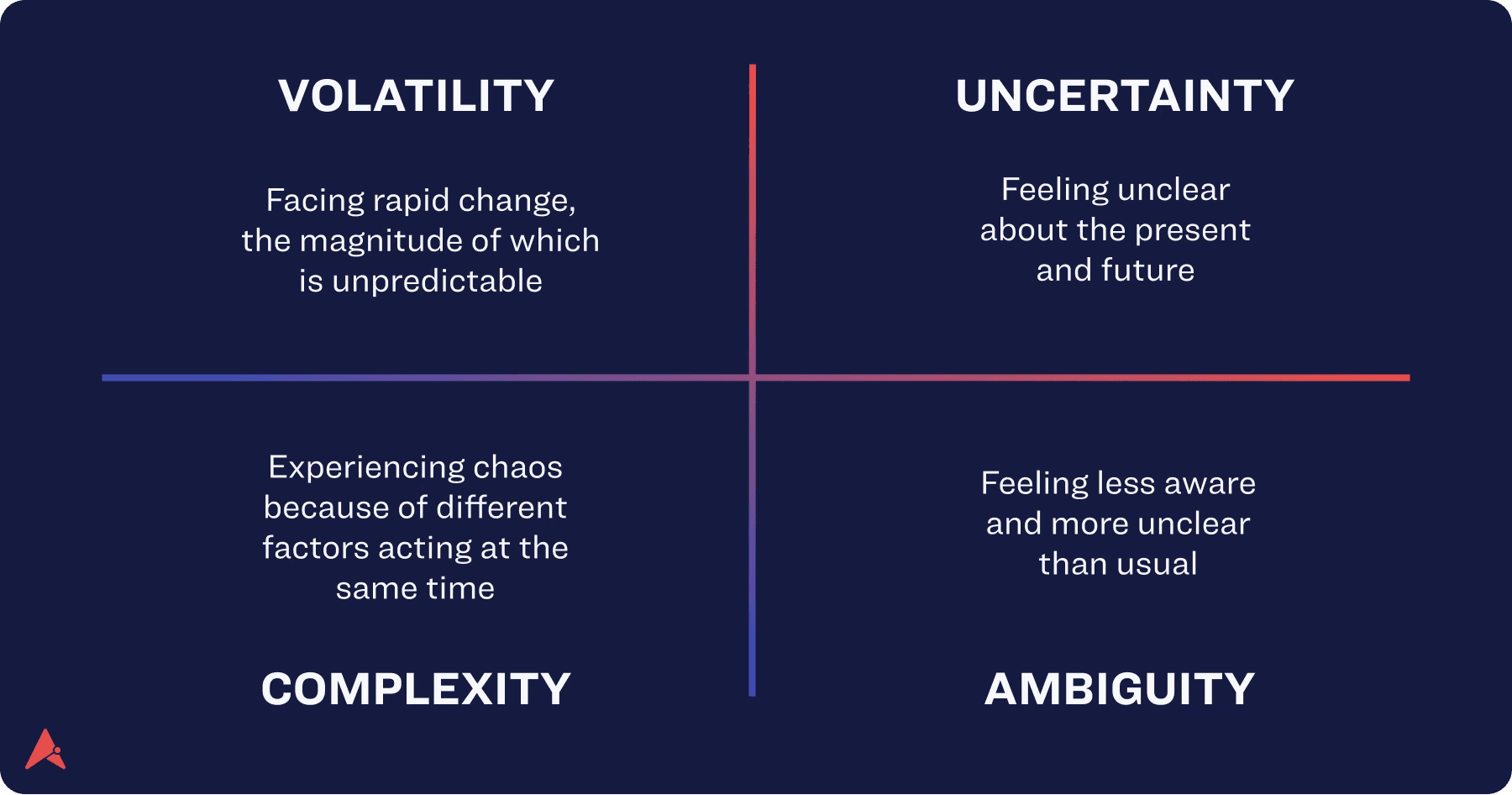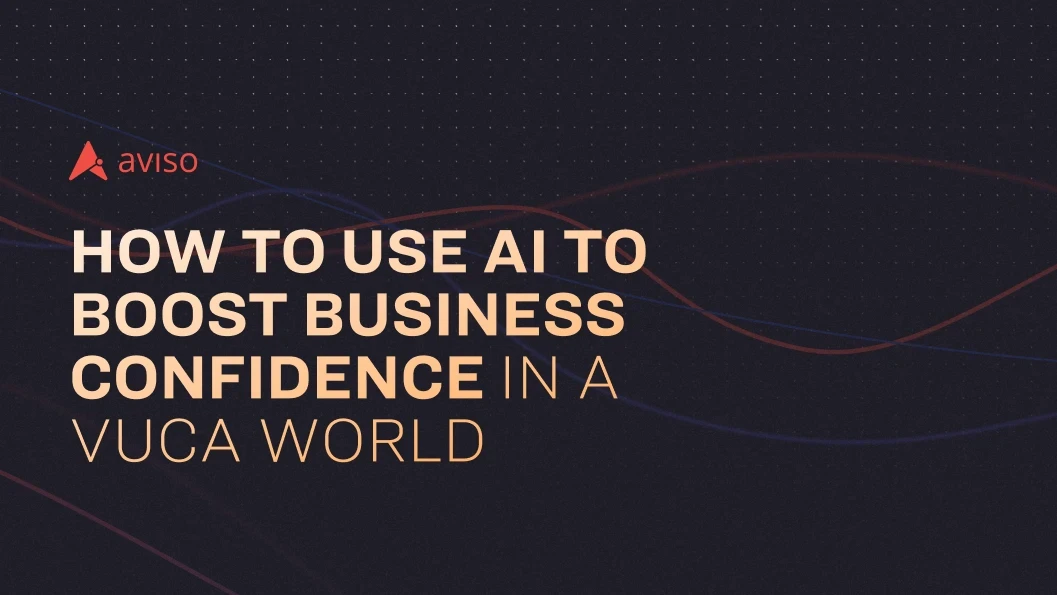How To Use AI To Boost Business Confidence In A VUCA World
Nov 18, 2020
Today's world has been described as the new normal, business as unusual" and even "permaweird." In companies around the globe:
Sales agents and marketers are asking: How am I supposed to grow client relationships without in-person interactions?
Team managers are asking: How can we understand which customer relationships are working, and evaluate team members appropriately?
The C-suite is wondering: How can we forecast reliably and trust our sales pipeline amid all this chaos and volatility?
In this post, I will introduce a framework, VUCA, and describe how AI can help businesses boost confidence.
False Versus True Confidence: The Hardest Question
VUCA stands for "volatility, uncertainty, complexity and ambiguity" of conditions. Coined by the U.S. Army War College as a way to describe the multipolar world after the Cold War, the concept has applicability beyond its original roots, especially for global businesses dealing with new health, economic and environmental crises. Here's a simple way to illustrate the framework. Are you and your team:
Facing rapid change, the magnitude of which is unpredictable (i.e., you're facing customer demand that's changing wildly)? That's Volatility.
Feeling unclear about the present and future (i.e., you don't know if you will run a Black Friday sale in 2021)? That's Uncertainty.
Experiencing chaos because of different factors acting at the same time (i.e., your CRM supplier in Spain was overrun by COVID-19)? That's Complexity.
Feeling less aware and clear than usual (i.e., your customer says they want to buy more even though their industry is suffering)? That's Ambiguity.

Surviving and growing confidence in VUCA environments is difficult, and that's where false versus true confidence comes in. In the first two quarters after the pandemic, many companies developed a veneer of false confidence from observing simplistic effects; for example, the bull run in the stock markets, or seamless work-from-home experiences with Zoom. However, I believe few businesses have true confidence during these uncertain times. Many aren't confident in the ability of their employees to adapt, or in the enduring strength of their business models. They don't have deep insights into customer behavior changes, sales activity and opportunity creation. Many are flying blind on pre-pandemic assumptions. True confidence comes from tackling the hardest questions, such as: What do we not know that could hurt us and put us out of business in a VUCA world?
Countering VUCA With Predictive AI
VUCA can paralyze a business. The best business leaders know that to counter VUCA, they need to systematically address each of its components:
Volatility: A North Star vision is essential. Knowing why a team is rowing in stormy waters helps teams tackle inclement weather, limited food rations and dangerous sea creatures.
Uncertainty: Understanding the future by imagining scenario plans is crucial. This includes aggressive and conservative scenarios of what competitors and customers are likely to do, as well as learning from analogous domains.
Complexity: Simplifying assumptions, messages and calls to action can increase clarity. Collaborating outside silos via sync/async work tools can help.
Ambiguity: Moving quickly is key to not getting overwhelmed. Additionally, equipping teams with tools that help them overcome cognitive biases helps.
AI can help with the areas listed above to tackle VUCA. Specifically, in my current role as the CMO of an AI software company, I see firsthand how time-series predictive AI is addressing a VUCA world. Unlike simple AI implementations such as chatbots, it takes an agnostic approach to signals, machine learning and the delivery of insights and actions to end users. Let's look at an example from my industry, sales, which is a profession fraught with VUCA, and how predictive AI can equip virtual sales and marketing teams like never before. Narrow AI approaches tend to focus on single slices of the sales process, such as tracking emails or recording sales calls, aiming to "improve" that slice. Time-series predictive AI can look at all of the disparate data sets generated during a revenue cycle, across CRM, calendars or chat messages. It also decodes both explicit and implicit human behaviors driving sales with machine learning. Finally, by cross-linking this data, the AI closes the gap between forecasting and deal execution, building a positive loop with timely personal nudges and team-wide actions. Some of the complex VUCA questions to answer with this data include:
Which deals are at risk? What deals from future quarters can be pulled in to meet this quarter's numbers?
Where is the pipeline strong, and where is it running dry?
Which team members are outperforming? How can we model others after them?
Making It Real: How AI Guidance Can Counter VUCA To Empower Virtual Selling
While sales and marketing teams are deprived of an invaluable superpower — the face-to-face, handshake-and-a-drink connection that humans treasure — AI guidance can help them turn long virtual selling cycles into wins. For 40 years, tools like CRMs were designed and deployed for an analog-selling world. Suddenly, however, I've seen 10 years of steady movement from analog to virtual digital selling get compressed in less than a year. To navigate this acceleration with AI guidance, your company should:
Provide a North Star aspiration for your company's true revenue potential that takes into account its past success and its ability to pivot to virtual selling.
Consolidate multiple chat, video and meeting tools into collaboration workspaces, with AI insights provided alongside human interaction (AI as extended team).
Automatically update underlying systems of record, such as your CRM, by capturing sales rep and team activity exhaust and only nudging teams with the field that is directly correlated with deal success.
A Compass For A VUCA Decade
Embracing advanced frameworks like VUCA can help steer your team toward safety and growth, and applying technologies like predictive AI can help your company build new muscle to succeed. With the power of AI and the right strategy to guide you, you can better understand the past, optimize for the present and prepare for the best future outcomes.







